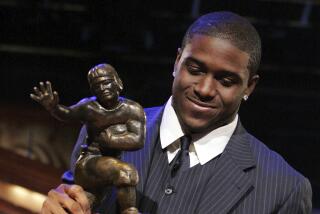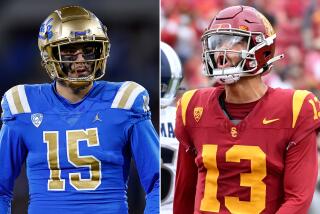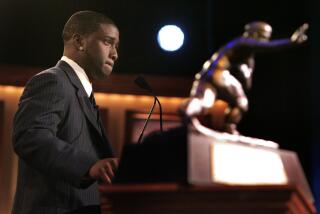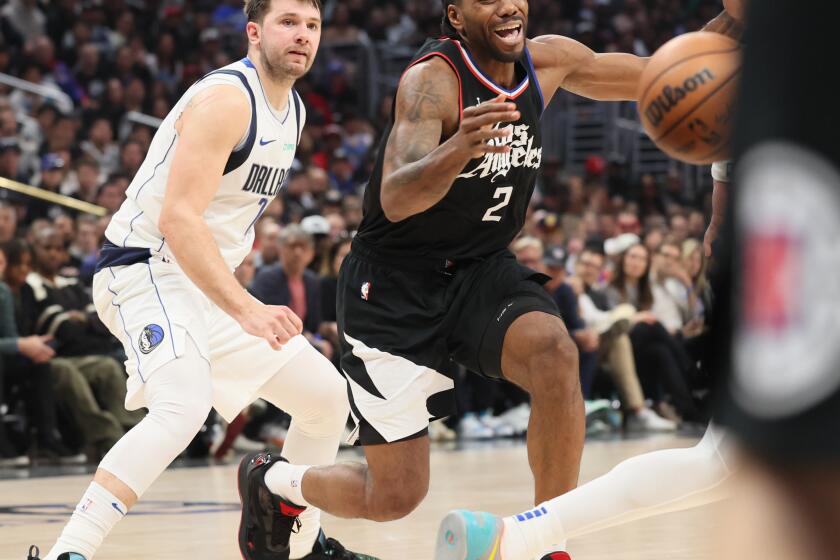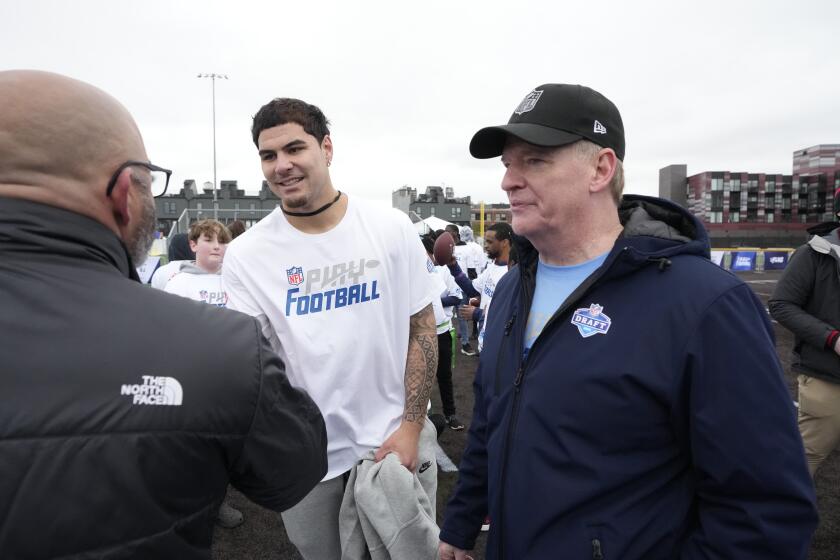NFL in L.A.
Today, Schmidt and Sanders debate whether luring the NFL to Los Angeles is worth the money. Later in the week, they’ll discuss the local politics surrounding the NFL, USC’s future at the Coliseum and more.
L.A. does fine without football
By Scott Olin Schmidt
Shortly after I moved to Los Angeles to begin graduate school at the University of Southern California, both the Raiders and the Rams left town. Ever since, Los Angeles’ elected officials have been courting the National Football League but in more than a decade, our city has found no takers.
The first question L.A. needs to ask itself is whether it wants a professional football team to begin with. After 12 years and counting of being NFL-free, our fair city seems to have survived quite nicely.
On any given Sunday between August and January, Angelenos get their pick of the best pro football games broadcast into their homes. Fans of various teams get together across the city to root for their home teams well, at least the home team of wherever they’re from. Los Angeles does not have a single “home team.” Instead, we have 32 we take our pick of NFL franchises, reflecting a diversity that is truly Los Angeles’.
Government, when at its best, should exist to provide those goods and services that the private sector does not. Although I might need a bridge, a freeway or an airport, I am in no position to build any of these, so I rely on the government to provide these public benefits. Those who advocate spending public money on bringing the NFL to Los Angeles, therefore, need to show that a professional football franchise constitutes a public benefit and that its funding should take priority over, say, a subway to the sea.
On its face, that proposition sounds absurd. The NFL is a private business that does quite well, thank you very much. With its fistfuls of cash, the NFL could easily pay for a nice new stadium in Los Angeles. But it’s cheaper to do that in Jacksonville, Charlotte or Houston, so the NFL took its business elsewhere.
Since we’re talking about the bottom line, by far the least expensive option for bringing the NFL to Los Angeles would be to use an existing stadium. Southern California has two great venues in the Los Angeles Memorial Coliseum and the Rose Bowl, and could possibly even expand the Home Depot Center but each of these comes with drawbacks.
The Coliseum must share its parking and facilities with its neighbors in Exposition Park, and an NFL team would have to share the facility with USC whether or not the university gets a “master lease” to operate the stadium. Bringing in an NFL team would restrict public access to the Science Center and Museum of Natural History on game days. Capacity reductions from stadium enhancements would leave about 20,000 Trojan fans out in the cold metaphorically, at least.
The Rose Bowl is a nightmare whenever a game draws more than 50,000 people which usually means that USC is playing there. I doubt NFL Commissioner Roger S. Goodell has to park on the 10th hole of the Brookside golf course when he visits the Rose Bowl.
According to a Federal Reserve study, the NFL generates value for communities because people pay more to live in a city with a pro football franchise. If you’re talking about the difference between Kansas City and Oklahoma City, or Omaha and Denver, this makes sense. Green Bay is on the map because of the Packers. Somehow I think Los Angeles wouldn’t benefit so much people already know we’re here and they keep coming, with or without an NFL team.
Scott Olin Schmidt covers Pac-10 football for AOL Sports’ FanHouse and politics at Spot-on.com. Schmidt is a transportation commissioner for the city of West Hollywood, where he operates his New Media Outreach consulting firm RSC Partners.
Private money, public effort
By Barry A. Sanders
Yes, Scott, our great city can live without an NFL team. We have done so for more than a decade. If the NFL requires our tax money as a condition to coming here, we should continue to do without an NFL team. However, the NFL understands it needs L.A. more than L.A. needs the NFL. I believe we can get a team here without spending dollars from our government coffers, and we should continue that effort.
This town boasts some of the world’s finest cultural, entertainment and sports attractions. We offer our residents and visitors the nation’s finest orchestra in the finest hall, a superb opera company, scores of legitimate theaters, countless movie screens, the world’s best and most famous theme parks, hundreds of museums, and fabulous parks and beaches. We have storied baseball and basketball teams on the professional and collegiate levels, and top-quality hockey, soccer, water polo, horse racing and almost any other professional or amateur sport you can name. We enjoy two of the best college football teams in the nation and a professional indoor football team. Why, then, should the vast number of sports-savvy Angelenos who follow professional football be denied the chance to attend NFL games?
Since at least the 1984 Olympics, our city’s method of attracting sports franchises and events has been to rely on the private sector. At the same time, we have turned to effective political leadership to champion the ideas and facilitate the projects. Former L.A. Mayor Tom Bradley was a leader in our privately financed Olympics, just as Mayor Antonio Villaraigosa was a leader in our recent privately financed effort to attract the 2016 Olympics. Imaginative city planning and regulations boosted the private financing necessary to make Staples Center a reality. The Music Center is a Los Angeles County facility, as are the Los Angeles County Museum of Art and the Museum of Natural History. The Science Center in Exposition Park is a state facility in a state park.
Government is deeply involved in enriching our cultural and recreational lives, and it should be so as long as it is done without raiding the budgets for our other priorities. Therefore, it is necessary and appropriate that the mayor, several county supervisors, several City Council members and the members of the Los Angeles Memorial Coliseum Commission have been actively involved in trying to attract an NFL team to Los Angeles. Furthermore, if government can find ways to make the NFL proposal more financially attractive without spending taxpayers’ money through such devices as tax increment financing and regulatory changes it should do so.
As to where the NFL team should play, I am a devout admirer of our historic Coliseum. It is an icon of our city for people all over the world. However, we have to face the facts. After many years of discussion, the NFL has expressed its reluctance to return to the Coliseum. As the Coliseum’s long-term tenant, USC would have to consent to sharing it with an NFL team. To mix athletic metaphors, these are high hurdles.
What is important is that the NFL returns to Los Angeles. Let the NFL team pitch its tent in a place that is convenient for fans and a boost to the surrounding community. Both the private sector and government officials of this city can and should approach this challenge with the energy and inventiveness of exciting NFL games.
Barry A. Sanders is an international corporate lawyer, member of the Coliseum Commission, president of the L.A. City Recreation and Parks Commission, chairman of the Southern California Committee for the Olympic Games, and an adjunct professor of communications studies at UCLA.
Day 1 | |
More to Read
Get our high school sports newsletter
Prep Rally is devoted to the SoCal high school sports experience, bringing you scores, stories and a behind-the-scenes look at what makes prep sports so popular.
You may occasionally receive promotional content from the Los Angeles Times.
